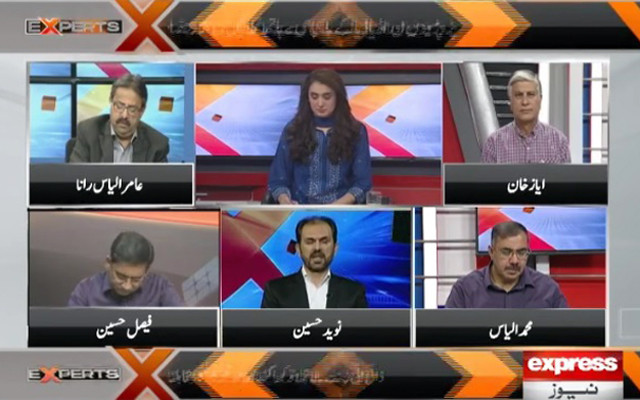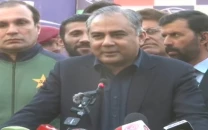Experts see reconciliation with Imran, India as key to economic revival
Naveed Hussain underscores critical link between political stability and achieving economic stability

Political analysts have unanimously stressed the pivotal role of collaborating with the incarcerated Pakistan Tehreek-e-Insaf (PTI) supremo, Imran Khan, and archrival India for the country's economic revival.
During the "Experts" talk show aired on Express News, Naveed Hussain, the Chief Editor of The Express Tribune, underscored the critical link between political stability and achieving economic stability.
Hussain advised that to attract foreign direct investment and ensure economic stability, the government must prioritise political stability, improve security conditions, and engage constructively with opposition parties.
The chief editor argued that the government showed reluctance to reconcile with the imprisoned PTI founder, Imran Khan. Hussain believes that even if the government desires dialogue with Khan, there are forces hindering such engagement, suggesting a deliberate effort to sideline the former PM from the system.
The senior journalist highlighted that genuine reconciliation requires the government to create a conducive environment. Hussain questioned whether the actions taken against PTI, both before and after the election, have truly cultivated an atmosphere conducive to reconciliation.
The senior analyst asserted that for the government to enhance the economic situation, it is essential for all political parties to come together and collaborate. Hussain claimed the party with the highest popular vote has been marginalised and denied an opportunity to participate effectively. He alleged that the government seeks an agreement on its own terms and conditions, likening it to holding a gun to someone's head.
Hussain also highlighted that the leader of the party in question is currently imprisoned, and efforts were made to undermine his party before the election, resulting in its key leadership being detained. The questionable verdicts and ongoing legal cases seem aimed at prolonging their incarceration, thus obstructing any chance of reconciliation.
In criticizing Prime Minister Shehbaz Sharif's comments, Hussain asserted that in Pakistan, tough decisions consistently burden the common people, while the elite enjoy annual benefits totaling two and a half billion. To enhance the economic landscape, he contends that the government must curb privileges for the elite.
Ayaz Khan, Group Editor of Daily Express, noted that prominent businessman, Arif Habib has suggested a collaborative approach. Khan believes the government is already inclined towards cooperation, citing statements by Ishaq Dar, the minister for foreign affairs, who has also discussed possibility of resuming trade with India. However, he thinks that Prime Minister Shahbaz Sharif seems to be seeking counsel from allies regarding the second handshake proposal.
The group editor underscored the essential role of the business community in any nation's economy. He noted that when Narendra Modi first assumed office as prime minister of India, it was suggested that the business community played a significant role in his election. After serving as prime minister for a second term, there are indications that Modi could secure a third term, given the apparent satisfaction and support from the country’s business community.
The senior analyst stressed the importance of political harmony, stating that it's crucial for both the country's economy and overall well-being. He believes that when all political factions collaborate, it facilitates smoother decision-making for the government.
He requested the prime minister to take some tough and difficult decisions now for the elite and the people sitting around him, specifically, he proposed bringing the elite class into the tax net to alleviate the burden on masses, suggesting that this move could potentially reduce the need for increasing taxes on salaried class.
Express News Bureau Chief in Islamabad, Amir Ilyas Rana, also underscored the need of political reconciliation for economic revival but on the other hand he also criticised the business community in a satiric tone, calling them “Alfaida”.
Rana also criticised the prime minister's assertion about tough decisions, highlighting that it's the common people who bear the brunt of inflation, taxes, and the expenses of the elite, rulers, and industrialists. He pointed out that the burden often falls on the common man in the form of reduced benefits or rebates.
The Islamabad bureau chief stressed the urgency of reconciliation among all political parties. He said it is unacceptable for the government and the state to resort to negotiations in Adiala Jail to address issues, while the founder of the PTI expresses a desire to acquire power through military intervention.
Referring to the past, Rana highlighted that when Imran Khan was offered talks by Asif Ali Zardari and Shehbaz Sharif, he would often dismiss their offers by labeling them as thieves and robbers.
Faisal Husain, the Karachi Bureau Chief for Express News, underscored the vital role of trade in the country's development, emphasising that in the current era, no nation can thrive without active participation in trade.
“If the trade takes place, it will benefit Pakistan and the unemployed youth as well, no matter how selfish a businessman is, he cannot do business without investing in men and capital,” Faisal observed.
He stressed that political harmony and reconciliation cannot be achieved by ignoring the prisoner of Adiala. He also described friendship with India as inevitable.
Express News Lahore Bureau Chief, Muhammad Ilyas, said that businessmen and industrialists have also provided the prime minister with solutions to the economic challenges facing the country.
Ilyas also stressed the need to shake hand with the leader of major party, he believes that progress can only be achieved when barriers are broken down and cooperation prevails.
The Lahore bureau chief stressed the importance of maintaining relations not only within the country but also with neighbouring nations. He expressed concern that Prime Minister Shehbaz Sharif seem hesitant to seek consultation, urging President Asif Ali Zardari to take this matter seriously. Ilyas stressed the necessity for all politicians to come together before the budget to alleviate the burden on the people.



















COMMENTS
Comments are moderated and generally will be posted if they are on-topic and not abusive.
For more information, please see our Comments FAQ